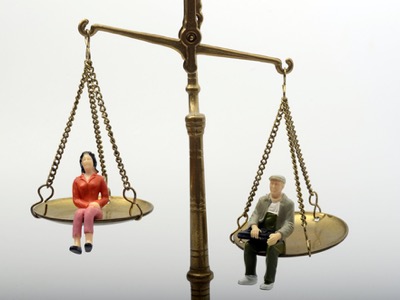Why Gender Equality is Good for Men – Part Two of Three
Guest contributed by Lisa Levey
Part One of Why Gender Equality is Good for Men looked at the positive effects for men in their relationships with their spouses and children.
Part Two focuses on the positive health implications – both physical and mental – for men with a more egalitarian world view.
Gender equality benefits men’s physical health
Gender is highly linked with health risks and outcomes and men continually draw the short stick. But men’s health challenges are substantially driven by their own attitudes and behaviors [which they can change.]
Men who espouse more traditional beliefs about gender make less healthy choices. They drink more alcohol, smoke more, and are more likely to take drugs as well as paying less attention to eating healthily or getting enough sleep. They’re less likely to seek medical care for preventive reasons or to follow their physician’s instructions when they do seek care. Real men don’t seem to think they need to cut their portion sizes as they age, limit how much beer they drink, or spend precious time going to the doctor but they make these decisions at their own peril.
Gender equality benefits men’s mental health
In addition to benefiting men’s physical health, gender equality plays a vital role in men’s mental health. Men more involved in the daily activities of raising children, as they rock their child to sleep, braid their daughter’s hair or give their teenager a shoulder to cry on, have the chance to experience a physical closeness and intimacy that is life affirming. Biology reveals that men are programmed for emotional connection. As men care for their children, the hormone’s associated with bonding rise, just as they do for women.
Gender equality powerfully benefits men’s mental health by countering the tendency toward isolation. In comparison to women, research indicates men struggle to a substantially greater degree with developing and sustaining friendships that feel fulfilling and meaningful.
Gender equality gives men permission to be soft – and bold, to be scared – and brave, to be silly – and serious, to be in control – and let go. It allows men the full range of their emotions, not just the socially acceptable ones like anger and desire.
Men who ascribe to less traditional gender norms have lower rates of depression and suicide, the most extreme response to the masculinity straight jacket that leaves men unable to reach out and to work through difficult emotions. Men commit suicide at four times the rate of women and middle age white men are more than twice as likely to kill themselves as the population at large. Clearly something is amiss for men.
Gender equality lowers men’s work-life stress
Men have been saddled with the primary breadwinning role for too long. And while the bias toward men as primary providers persists, a Pew study suggests there may be change afoot. While more than 70% of women and men reported it was very important for a man to be a good provider, women identified their breadwinning responsibility – and that of other women – as far more important than men.
It’s understandable why many men struggle with not being the primary provider, a role for which they have long felt acute responsibility and received social and financial reward. Yet many men fail to see how their partner’s earning capacity provides not only far greater security for the family but also far more flexibility for them. With a financial teammate, men can more easily contemplate starting a business, leaving a bad employer, or push for a promotion. Gender equality helps men to not feel stuck and without options.
Multiple research studies document that men in more egalitarian relationships report lower levels of work-life stress. What may seem counterintuitive for men is that devoting more time to their lives outside of work actually minimizes their work-life stress. The same has not been found to be true for women.
The conclusion seems to be that women and men who intentionally share home and child care responsibilities can simultaneously enable women to focus more freely on their careers and men to feel less pressured to always be working. It enables men and women to engage in multiple deeply meaningful roles in their lives.
Contributor Bio
Lisa Levey is a veteran diversity consultant, having worked with leading organizations for more than two decades to assist them in realizing the underutilized leadership potential of women. Her current work focuses on engaging men as allies and partners. She led the design and development of the Forte Foundation’s Male Ally signature resource platform for engaging men in diversity work and architected a pilot program to launch corporate male ally groups. She blogs for the Huffington Post and the Good Men Project on gender norms at work and at home. In the spring of 2018 partnering with her husband Bryan, Lisa is launching Genderworks, a coaching practice for dual-career professional parents to support them in navigating the obstacles to gender equality at work and at home. Lisa earned an MBA with highest honors from the Simmons School of Management and a BS with distinction from Cornell University in applied economics.
Disclaimer: The opinions and views of guest contributors are not necessarily those of theglasshammer.com











